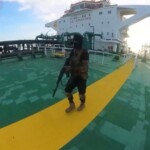Ukraine’s secret and speedy cross-border incursion into Russia surprised not only its enemy, but even the nation’s own troops, according to a senior official part who was part of the mission.
“We exploded the myth that Russia is an invincible country,” Lt. Col. Artem Kholodkevych, a senior officer from the 61st Mechanized Brigade, one of the key units in the attack in the western Kursk region, told the Wall Street Journal. “We did something that no one has done for 80 years.”
The operation, which began Aug. 6 and has so far seized about 100 towns and villages, is the first large-scale invasion of Russia since World War II.
Ukrainian forces continue to make gains in the region, even as Russia has sent reinforcements — including some troops pulled from the front lines in Ukraine.
It was orchestrated by Gen. Oleksandr Syrskiy, who took over in February.
Experts said Syrskiy apparently learned from a failed counteroffensive last year, when Ukraine consulted with the US and other Western allies and broadcast its plans with videos and public comments.
Many have praised the daring move, which has put Ukraine on the offensive and boosted moral in the country.
“This is not about a popularity contest,” retired Lt. Gen. Ben Hodges, a former commander of the U.S. Army in Europe, told the WSJ. “It’s about achieving strategic effect, which means you have to accept risk in other areas.”
Ukrainian President Zelensky has called the land taken in Kursk a “buffer zone” to impede Russian military operations. Kyiv’s forces are still taking prisoners in hopes of trading its own citizens detained in Russia.
The country is using new tactics and equipment, including using small explosive drones made in Ukraine to strike down helicopters and Russian surveillance drones, according to reports.
The cross-border attack is legitimate and covered by Ukraine’s right to self-defense, NATO Secretary-General Jens Stoltenberg told a local German news outlet. “Ukraine has a right to defend itself,” Stoltenberg said, “and according to international law, this right does not stop at the border.”
NATO was not informed about Ukraine’s plans beforehand and did not play a role in them, he added.
“Like all military operations, this comes with risks,” Stoltenberg said. “But it is Ukraine’s decision how to defend itself.”
While the incursion changed the narrative of the war, it has not prevented Russia from continuing to attack inside Ukraine. Russia has called the Kursk operation a “major provocation” and said it would retaliate.
Russian President Vladimir Putin launched a full-scale invasion in February 2022.
Start your day with all you need to know
Morning Report delivers the latest news, videos, photos and more.
Thanks for signing up!
On Monday, Russia attacked energy facilities across Ukraine in airstrikes that Ukrainian officials said involved more than 200 missiles and drones.
The two countries continued to trade strikes on Belograd and Kharkiv late Friday.
The Ukrainian strike on the Russian city left five dead and 46 injured, while the Russian strike on a Kharkiv apartment building killed seven.
“This afternoon, Russia struck an apartment building in Kharkiv with a guided aerial bomb, killing several and injuring many, including children,” US ambassador to Kyiv Bridget Brink said on X Friday.
“Our thoughts are with the people of Kharkiv as rescue operations are underway,” Brink said. “Russia must be held accountable for these war crimes.”
In other developments …
- A Ukrainian delegation met with the national security advisors of the U.S., the U.K., Germany and France in Washington Saturday. The group discussed the need to “further strengthen Ukraine’s air defense and energy system protection,” according to the Zelensky’s office.
- Zelensky said he will present a peace plan to President Biden, Vice President Harris and former President Trump in September. He spoke of a four-stage plan at a news conference in the capital and said the Kursk incursion was its first pillar.
- Russian trust in President Vladimir Putin dropped to a record 2024 low amid Ukraine’s incursion into the Kursk region, according to a poll by Russia’s Levada Center, an independent research center based in Moscow. State-owned polling agencies, however, say there have been “limited upticks” in Russian domestic discontent.
With Post wires







